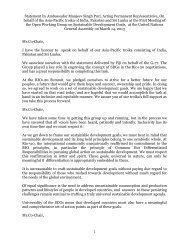INFM - 9 - Member States Portal
INFM - 9 - Member States Portal
INFM - 9 - Member States Portal
Create successful ePaper yourself
Turn your PDF publications into a flip-book with our unique Google optimized e-Paper software.
United Nations<br />
<strong>INFM</strong> Inter-Agency Network of Facilities Managers<br />
<strong>INFM</strong> - 9<br />
Facilitated by:<br />
Office of Central Support Services<br />
United Nations Headquarters<br />
New York<br />
Hosted by:<br />
Council of Europe<br />
Strasbourg, France<br />
FINAL REPORT<br />
Ninth Annual Meeting<br />
May 11‐12 2009<br />
Page 1 of 19
TABLE OF CONTENTS<br />
I. Report of <strong>INFM</strong>-9 3<br />
A. Introduction 3<br />
1. Opening Remarks of <strong>INFM</strong>-9 3<br />
2. <strong>INFM</strong>-9 Participation, Goals and Expectations 3<br />
B. Summary and Recommendations of <strong>INFM</strong>-8 by <strong>INFM</strong>-9 Chairperson<br />
Ms. Andrea Henrichsen, Chief of General Services Section, ECLAC<br />
C. Presentations of <strong>INFM</strong>-9 discussion topics (can be viewed on i-Meets<br />
website)<br />
4<br />
5<br />
D. Recommendations of <strong>INFM</strong>-9 6<br />
E. Working Groups formed at <strong>INFM</strong>-9 8<br />
F. Evaluation and Feedback of <strong>INFM</strong>-9 10<br />
G. Group Photo of <strong>INFM</strong>-9 13<br />
H. List of <strong>INFM</strong>-9 Participants 13<br />
II. Agenda of <strong>INFM</strong>-9 meeting 15<br />
Page 2 of 19
I. Report of <strong>INFM</strong>-9<br />
A. Introduction<br />
The ninth annual session of the Inter-Agency Network of Facilities Managers (<strong>INFM</strong>) was held<br />
at the Council of Europe in Strasbourg, France from 11 to 12 May 2009 for all participants. The<br />
meeting welcomed 41 participants representing 30 UN duty stations, Regional Commissions, Funds,<br />
Program Specialized Agencies, and other International Organizations. <strong>INFM</strong> is an organization<br />
dedicated to promoting best practices in the management of facilities. Each year we come together to<br />
share ideas and common practices in the facilities industry as well as to compare management of<br />
facilities through benchmarking, performance indicators and sustainable practices.<br />
1. Opening Remarks of <strong>INFM</strong>-9:<br />
Ms. Andrea Henrichsen, Chief of General Services Section, ECLAC (<strong>INFM</strong>-9 Chairperson)<br />
Mr. Mário Martins, Director General of Administration and Logistics, Council of Europe<br />
Mr. Clemens M. Adams, Director of Facilities and Commercial Services Division, OCSS/ UNHQ<br />
Ms. Gunilla Hedman, Director of Logistics, COE (<strong>INFM</strong>-9 Vice-Chairperson)<br />
Ms. Andrea Henrichsen presented an introductory address to all <strong>INFM</strong>-9 participants.<br />
This was followed by welcome remarks from Mr. Mário Martins who welcomed all<br />
participants to the Council of Europe located in Strasbourg, France. Opening addresses were<br />
provided by Mr. Clemens M. Adams and Ms. Gunilla Hedman. Mr. Adams thanked the<br />
coordinators, Ms. Andrea Henrichsen, Ms. Gunilla Hedman, and the Council of Europe for<br />
their effort, enthusiastic planning, and accomplishment in organizing this extensive and diverse<br />
conference for the <strong>INFM</strong>-9 participants. He encouraged the speakers and participants to take<br />
this next couple of days to participate in this rare opportunity to exchange best practices and<br />
ideas on Facilities Management.<br />
2. <strong>INFM</strong>-9 Participation, Goals and Expectations<br />
When participants shared their plans and expected outcomes of this conference, many expressed<br />
a repeated theme of their desire to “meet, share and learn” from colleagues about best practices and<br />
experiences working in facilities management.<br />
Page 3 of 19
B. Summaries of Findings and Recommendations <strong>INFM</strong>-8<br />
Ms. Andrea Henrichsen, <strong>INFM</strong>-9 Chairperson<br />
Chief of General Services Section, ECLAC<br />
Long-Term Maintenance and Conservation Plans (Capital Master Plans): It was recommended<br />
that comprehensive long-term maintenance and conservation plans (master plans) be elaborated in<br />
every organization, in particular with a view to ensure an appropriate follow up to major renovation or<br />
capital master plans. <strong>INFM</strong>-8 reaffirmed that the facilities management focus should be more<br />
proactive in addressing serious deferred maintenance, conservation and renovation issues in a timely<br />
manner before they negatively impact on programme execution, regular operations and, first of all<br />
safety and health of staff and delegates. Long-term maintenance and conservation plans (capital master<br />
plans) supported by adequate funding would enable organizations to avoid deferring major urgent<br />
renovation works and provide more cost effective and efficient maintenance and conservation<br />
(ensuring the safety, health and operations of facilities); <strong>INFM</strong>-8 recommends that all major<br />
renovations are planned and implemented to satisfy the following order of priorities: safety, hygiene,<br />
security, ecological and sustainable criteria. This will minimize adverse effects of eventual under -<br />
budgeting.<br />
Funding Major Renovation and Maintenance Projects: It was found that participating<br />
organizations and agencies should put in place Real Estate or Capital Expenditure Funds, which could<br />
be financed from respective regular budgets. The main purpose of such funds would be to provide<br />
resources and financing for long-term maintenance and conservation plans (master plans), as well as<br />
major renovation and capital investment (JIU/REPORT/2006/4). Real Estate or Capital Expenditure<br />
Funds would accumulate resources and outbalance inflation impacts through interest earnings.<br />
Secretariats of those Organizations, which have not yet established the above mechanism, are invited<br />
to address their respective legislative bodies in order to attain this objective. The rate of regular budget<br />
allocations to Real Estate or Capital Expenditure Funds should be established by every organization<br />
individually, on the basis of estimated value (market value/insurance value) of buildings and premises,<br />
taking into account their quality and state of repair and be situated between 1 and 4% of the estimated<br />
value.<br />
Participation of Field Specialists: Audit teams for FM should be composed and staffed by<br />
specialists in the field in order to avoid difficulties in understanding the functioning; and in order to<br />
better formulate recommendations intended to enhance delivery and efficiency.<br />
Long Term Sustainability & Energy Savings: <strong>INFM</strong>-8 recognizes that many initiatives have been<br />
developed throughout the Organization and the <strong>INFM</strong> members’ institutions to improve energy<br />
efficiency and lower carbon impact. The <strong>INFM</strong>-8 welcomes the support of the SUN team and their<br />
offer to provide advisory services and support to reform towards climate neutrality by reducing the<br />
generation of greenhouses gases, in particular for the development of specific guidelines in the<br />
building management, procurement and Organizational culture areas for benchmarking and how to<br />
formulate the necessary data. Additionally, some <strong>INFM</strong> members raised the issue of differentiating<br />
between owned and rented facilities, due to the limitations in reducing carbon emissions in those<br />
rented facilities.<br />
<strong>INFM</strong> Website: It was recommended that each <strong>INFM</strong> members should contribute and post one<br />
relevant project or Facilities Management article to the <strong>INFM</strong> website per year for the benefit of all.<br />
Page 4 of 19
C. Presentations of <strong>INFM</strong>-9 discussion topics<br />
The following facilities management topics were presented and discussed. The presentations can be<br />
found on i-Meets members’ website (To access via internet go to: http://infm.un.int)<br />
Business Continuity<br />
1. Business Continuity: An All Hazards Approach by Mr. Chatiya Nantham, ADB<br />
2. Inter-Agency Business Continuity Plan in Santiago by Ms. Andrea Henrichsen, ECLAC<br />
Benchmarking & Performance Indicators<br />
3. Benchmarking & Performance Indicators by Mr. Alireza Ghaemi, UNIDO<br />
4. Results Indicators & Benchmarks for Helpdesk by Mr. Guy Girod, ILO<br />
Performance Based Contracts<br />
5. Performance Based Contracts by Mr. Chatiya Nantham, ADB<br />
6. Performance Based Contracts by Mr. Andrew Robertson, UNMIS, DFS<br />
Facilities Management in Peacekeeping Missions<br />
7. Facilities Management in Peacekeeping Missions by Mr. Andrew Robertson, UNMIS, DFS<br />
8. Facilities Management in Peacekeeping Missions by Ms. Dubravka Marijanovic-Prolic, DFS<br />
Funding for Major Renovations & Long-Term Maintenance<br />
9. Capital Master Plan at UN Headquarters, Michael Adlerstein, Assistant Secretary-General of the<br />
Capital Master Plan, UNHQ. *<br />
10. Strategic Heritage Plan-Renovation of the Palais des Nations by Mr. Anatoli Kondrachov, UNOG<br />
11. Renovations/Densification and Extension of WTO Building in Geneva by Ms. Teresa Garcia Gill,<br />
WTO<br />
12. Building Infrastructure and Life Cycle Maintenance by Ms. Mary Beth Kelly, IMF<br />
Environmental Impact on Facilities Management<br />
13. Impact on UN Climate Neutral Strategy and Guidelines by Ms. Inhee Chung, UNEP/SUN<br />
14. Long Term Arrangement on Reducing Energy Consumption by Mr. Romain Kieffer, UNOV<br />
15. Environmental Management System for FAO by Ms. Tina Mittendorf, FAO<br />
Technology for Conference Facilities<br />
16. Technology for Conference Facilities by Mr. Stephen Stannah, UNON<br />
* PowerPoint presentation is not available.<br />
Page 5 of 19
D. Recommendations of <strong>INFM</strong>-9<br />
Organizations participating in <strong>INFM</strong> reconfirm:<br />
Maintaining the format of the annual meetings (3 days) and procedures developed by the<br />
network since its establishment;<br />
Aiming at sharing experiences and establishing best practices in facilities management.<br />
The UN system participants of <strong>INFM</strong> also confirm their will to reinforce the One UN principle<br />
in facilities management.<br />
Develop a common energy-saving and environmental/sustainable practice.<br />
Establish Working Groups and Terms of Reference (TOR) to implement <strong>INFM</strong>-9<br />
recommendations and populate the electronic Library.<br />
1. Recommendations addressed to <strong>INFM</strong><br />
<strong>INFM</strong> has to undertake every effort in order to develop common guidelines and<br />
instruments for facilities management:<br />
Complete the creation of a coherent database for further developing common<br />
benchmarking tools;<br />
<br />
<br />
<br />
<br />
Develop a glossary relating to facilities management;<br />
Establish a reference library on facilities management (preparedness plans, business<br />
continuity plans, space management, revenue generating activities, charge-back<br />
practices, regulations, documents on environmental/sustainable policies and guidelines<br />
etc.;<br />
Develop recommendations for capital master and renovation plans;<br />
Continue establishing agendas and timeframes for future meetings in consultation with<br />
participating organizations.<br />
2. Recommendations to be addressed to senior management<br />
<strong>INFM</strong>-9 reconfirms <strong>INFM</strong>-7 and <strong>INFM</strong>-8 recommendations that comprehensive longterm<br />
maintenance and conservation plans (capital master plans) be elaborated in every<br />
organization, in particular with a view to ensure an appropriate follow up to major<br />
renovation or capital master plans. Long-term maintenance and conservation plans<br />
(capital master plans) supported by adequate funding would enable organizations to<br />
avoid or to defer major renovation works, maintain the asset value, and provide more<br />
cost effective and efficient maintenance and conservation.<br />
<br />
<strong>INFM</strong>-9 reaffirmed that the organizations’ approach toward facilities management<br />
should be more supportive in addressing serious deferred maintenance, conservation<br />
and renovation issues in a timely manner before they negatively impact on programme<br />
execution, regular operations and, first of all safety and health of staff and delegates.<br />
3. <strong>INFM</strong>-9 Recommendations to <strong>INFM</strong>-10<br />
Subjects representing priority interest and for future meetings:<br />
o Funding for long-term maintenance, conservation and renovation/CMP, discuss and<br />
review criteria on budgeting infrastructure and life cycle maintenance evaluation;<br />
o Charge back system;<br />
o Space management and office space guidelines;<br />
Page 6 of 19
o Benchmarking and performance indicators;<br />
o Comprehensive approaches to FM’s environmental and sustainability issues;<br />
o Procurement in FM;<br />
o Website Development<br />
4. <strong>INFM</strong>-10<br />
<strong>INFM</strong>-10 will take place in 2010 in United Nations Office Nairobi (UNON), Kenya.<br />
Ms. Gunilla Hedman (Council of Europe) was elected Chairperson and Mr Stephen<br />
Stannah (UNON),Vice-Chairperson of <strong>INFM</strong>-10.<br />
Page 7 of 19
E. Working Groups formed at <strong>INFM</strong>-9<br />
1. <strong>INFM</strong> Website (All <strong>Member</strong>s):<br />
a. Ongoing contribution of members is deemed necessary<br />
b. Provide information on SOW and draft contracts of professional services (i.e.<br />
architectural/engineering design, specialty consultancy services).<br />
c. Provide information on SOW and draft contracts of common services.<br />
d. Information provided by the <strong>INFM</strong> members should be classified and saved in a thematic<br />
library as a valuable reference and benchmarking resource.<br />
2. <strong>INFM</strong> Website Library (UNHQ):<br />
a. Include a Glossary of terms to enable standard language (i.e. Long Term Planning, Capital<br />
renovation, maintenance/ replacement Programme, rolling plan, Capital plan, major<br />
improvements). All <strong>INFM</strong> members are to submit a definition of their programme<br />
planning/ alterations programme defining the wording of the different stages.<br />
b. Include information on policy maters and contracts:<br />
1. Create a thematic Library to enable fast search. (search option to be included within the<br />
site).<br />
2. Publish examples of BCP<br />
3. Publish Avian Flu Pandemic Preparedness Plan.<br />
4. Publish Office Space Standards per Organization. (attach a schematic layout indicating<br />
basic modules).<br />
5. Furniture standards and policy (photographs, systems contracts, prices and selection<br />
process.<br />
6. Draft contract of CMP MG Price. Estimators’ SOW/ Contract.<br />
7. CMP: description of how they built in the inflation and contingency factors and<br />
information on percentages requested and granted.<br />
8. Clients Service Surveys from different Organization.<br />
9. Strategy ‘guidelines’ on Environmental / sustainable policies.<br />
10. Certification process (ADB).<br />
3. Charge-back for common services (UNHQ):<br />
a. Lease of office space (prices/ calculation of leased space)<br />
b. Director General’s / Executive Secretary’s Residence: leased, owned, maintenance.<br />
c. Parking space (charges, policy, monitoring)<br />
4. Business Continuity Plan (ADB &ECLAC):<br />
a. A Business Continuity Plan (BCP) must differentiate between crisis versus pandemic<br />
(structural threats versus medical threats) response and approach.<br />
b. A BCP plan must be clearly articulated; senior management and selected critical task force<br />
members must agree to participate.<br />
c. BCP “needs ongoing maintenance/review”.<br />
d. Share with members generic BCP principles.<br />
e. Share Avian Flu Pandemic preparedness plan. (By country and Region)<br />
5. Benchmarking (UNIDO/BMS&UNFPA&ILO):<br />
a. Benchmarking is a vital topic to keep within our organization and should be continued.<br />
Page 8 of 19
. Discrepancies in information should be identified and shared for clarification on a one-toone<br />
basis.<br />
1. Incorporate and clearly stipulate working hours for data collection comparison.<br />
2. Develop glossary of terms (to include within the glossary of the Library).<br />
3. Several Organizations have recommended hiring a Consultant who shall standardize the<br />
data and compile the information spending an allotted amount of time with every<br />
<strong>INFM</strong>.<br />
4. Organization. The expenditure shall be paid for in equal parts among the members. (To<br />
decide leading Organization to contract these services).<br />
6. Development of a Capital Master Plan Criteria (UNESCO&WTO&UNHQ):<br />
a. The criteria for a Capital Master Plan needs to be consistently used by organizations in<br />
order to develop comparisons and understand contrasts between organizations.<br />
b. Organizations need to develop a better procedure for budgeting to take in organizational<br />
“factors” (UN or other).<br />
c. The critical aspect of major renovations is related to evaluating how to maintain continuity<br />
of business operations in premises, or not, must be financially evaluated (phased renovation<br />
or use swing space, etc.).<br />
d. This working group will request members to share substantiating criteria to raise<br />
management and public awareness in order to gain budget approval and backing for Capital<br />
renovations.<br />
7. Sustainability (UNEP/SUN&COE):<br />
a. Sustainability issues, findings, audits, etc. should be shared with <strong>INFM</strong> members to use as<br />
a benchmarking tool for other agencies.<br />
b. <strong>INFM</strong> to compile a list of environmental/sustainable actions taken by each organization.<br />
c. Comparison to determine effectiveness/energy reduction results in changing standard<br />
temperature of building winter and summer.<br />
1. Request that UNEP develop guidelines for shared and rental premises.<br />
2. UNEP’s definition on Clean Development management versus Energy Neutral/<br />
Sustainable building.<br />
3. Estimate our greenhouse gas emissions consistent with accepted international<br />
standards; (benchmarking)<br />
4. Undertake efforts to reduce our greenhouse gas emissions to the extent possible; and<br />
5. Analyze the cost implications and explore budgetary modalities, including consulting<br />
with governing bodies as needed - of purchasing carbon offsets to eventually reach<br />
climate neutrality.<br />
8. Video teleconference Meetings (WFP & UNHQ)<br />
Video-teleconference meetings will be coordinated to review in-depth topics.<br />
Page 9 of 19
F. Evaluation and Feedback of <strong>INFM</strong>-9<br />
An evaluation form of the <strong>INFM</strong>-9 conference was distributed to all participants who attended in<br />
order to assess the level of satisfaction, understand the strengths and identify opportunities for<br />
improvements. The results summarized below reflect the responses of 21 participants out of the total<br />
of 42 members who attended the conference this year.<br />
1. What are your overall feedback/comments of the <strong>INFM</strong>-9 meeting?<br />
*Need more structure<br />
for presentations<br />
*Time management<br />
was an issue<br />
28%<br />
72%<br />
*Presentations are very useful<br />
*Geat opportunity to exchange ideas<br />
*Learned from other participants<br />
Postive Feedback<br />
Opportunites for Improvements<br />
2. Feedback/Comments in the Agenda items?<br />
a. Were the topics useful?<br />
*Some topics did not directly<br />
relate to members' field of work *Provided different and insightful<br />
*Too many topics 14%<br />
approaches to facilies management<br />
*Broad range of topics<br />
86% *Able to share the lessons learned<br />
All topics are useful<br />
Not all topics were useful<br />
b. Was the time allocated to each Agenda topic sufficient?<br />
*Little time for comments<br />
after each presentation<br />
*Presentations were too<br />
long<br />
14% * Satisfied that each topic<br />
in the agenda was<br />
presented<br />
86%<br />
Yes<br />
No<br />
Page 10 of 19
c. Name the topic that you considered:<br />
1. Most useful<br />
While most participants found environmental and sustainability topics the most useful,<br />
three other topics also provided helpful insight into facility management issues.<br />
13%<br />
19%<br />
19%<br />
49%<br />
Environment & Sustainability<br />
Business Continuity<br />
Benchmarking & Performance Indicators<br />
Funding for Major Renovations & Long-Term Maintenance<br />
2. Least useful<br />
A few participants found the presentation on Peacekeeping Missions to be the least<br />
useful, mainly because it did not deal with their work.<br />
71%<br />
29%<br />
Least Useful:<br />
Presentations on<br />
Peacekeeping Missions<br />
d. What additional objectives do you think should have been accomplished at <strong>INFM</strong>-9?<br />
14% of those who participated in this evaluation felt that security related issues need to be<br />
discussed on more regular basis.<br />
3. Did <strong>INFM</strong>-9 allow sufficient exchange of ideas with fellow participants?<br />
All participants felt that <strong>INFM</strong>-9 was an important opportunity to share ideas and learn from<br />
one another’s experiences.<br />
4. Duration of <strong>INFM</strong>-9 (1 – too long; 2 – adequate and 3 – too short)<br />
All with the exception of one felt that the <strong>INFM</strong>-9 was too short. Generally, participants found<br />
that using all the 3 days would be more beneficial.<br />
Page 11 of 19
5. Feedback / Comments on the preparation for <strong>INFM</strong>-9.<br />
a. Information was received in advance<br />
*Recommend early<br />
circulation of<br />
presentations<br />
26%<br />
74%<br />
*Comprehensive<br />
and useful<br />
*Well organized<br />
Yes<br />
No<br />
b. Information/Details of the facilities including travel and hotel accommodation<br />
All participants expressed positive feedback on receiving information on travel and hotel<br />
accommodations.<br />
c. Information flow using ‘i-Meets” in <strong>INFM</strong> website<br />
19% 33%<br />
48%<br />
Can be improved<br />
Adequate<br />
Never used<br />
6. Do you have other comments that you would like the organizing team to take into<br />
consideration in planning for <strong>INFM</strong>-10 and subsequent meetings?<br />
* Invite specialists (i.e. procurement, audit) who are not necessarily <strong>INFM</strong> members to be<br />
speakers on specific issues.<br />
* Keep <strong>INFM</strong> conference for full period (2 ½ - 3 days).<br />
* Establish Facilities Management Standard Operating Procedures and Guidelines.<br />
* 3 months preparation will allow sufficient time for speakers to prepare the materials.<br />
* Ask each organization to participate financially in order to finalize a glossary and data of<br />
indicators and benchmarks amongst <strong>INFM</strong> participants.<br />
Page 12 of 19
G. Group Photo<br />
H. List of <strong>INFM</strong>-9 Participants<br />
No. Name<br />
Organization and Location<br />
1 Mr. Adeyinka Okuwoga International Atomic Energy Agency (IAEA),Vienna, Austria<br />
2 Mr. Alessandro Sodano World Food Programme (WFP), Rome, Italy<br />
3 Mr. Alexander Barabanov United Nations Office at Nairobi (UNON), Nairobi, Kenya<br />
4 Mr. Alireza Ghaemi United Nations Industrial Development Organization (UNIDO), Vienna, Austria<br />
5 Mr. Anatoly Egoshkin Untied Nations Educational, Scientific and Cultural Organization (UNESCO),<br />
Paris, France<br />
6 Ms. Andrea Henrichsen Economic Commission for Latin America and the Caribbean (ECLAC),<br />
Santiago, Chile<br />
7 Mr. Andrew Nye United Nations Headquarters (UNHQ), New York, USA<br />
8 Mr. Andrew Robertson United Nations Mission in Sudan (UNMIS), Khartoum, Sudan<br />
9 Mr. Anis Chibli United Nations Office at Geneva (UNOG), Geneva, Switzerland<br />
10 Ms. Anna Sayagh International Fund for Agricultural Development (IFAD), Rome, Italy<br />
11 Mr. Antonio Giuffrida Organization for the Prohibition of Chemical Weapons (OPCW), The Hague,<br />
The Netherlands<br />
12 Ms. Brenda Behan World Food Programme (WFP), Rome, Italy<br />
13 Ms. Celina Kersh United Nations Headquarters (UNHQ), New York, USA<br />
Page 13 of 19
No. Name<br />
Organization and Location<br />
14 Mr. Chatiya Nantham Asian Development Bank (ADB), Manila, The Philippines<br />
15 Mr. Clemens M. Adams United Nations Headquarters (UNHQ), New York, USA<br />
16 Mr. David Kafui Gaba International Tribunal for the Law of the Sea (ITLOS), Hamburg, Germany<br />
17 Mr. Deeb Ibrahim Economic and Social Commission for Western Asia (ESCWA), Beirut, Lebanon<br />
18 Ms. Dubravka<br />
Marijanovic-Prolic<br />
United Nations Headquarters (UNHQ), New York, USA<br />
19 Mr. Frank Malle Economic Commission for Africa (ECA), Addis Ababa, Ethiopia<br />
20 Mr. Gérard Turcato International Labour Organization (ILO), Geneva, Switzerland<br />
21 Ms. Gunilla Hedman Council of Europe (COE), Strasbourg, France<br />
22 Mr. Guy Girod International Labour Organization (ILO), Geneva, Switzerland<br />
23 Mr. Halim Nader Economic and Social Commission for Western Asia (ESCWA), Beirut, Lebanon<br />
24 Mr. Hanns Holl United Nations Volunteers (UNV) - Bonn<br />
25 Ms. Heather Kilner International Criminal Tribunal for the former Yugoslavia (UNICTY), The<br />
Hague, The Netherlands<br />
26 Ms. Ibrahima N’Gaide World Health Organization (WHO), Geneva, Switzerland<br />
27 Ms. Inhee Chung United Nations Environment Programme (UNEP) - Paris Office<br />
28 Mr. Jaroslaw<br />
United Nations Children’s Fund (UNICEF), New York, USA<br />
Chomanczuk<br />
29 Ms. Marilu Blanco-Borra Untied Nations Educational, Scientific and Cultural Organization (UNESCO),<br />
Paris, France<br />
30 Ms. Mary Beth Kelly International Monetary Fund (IMF) – Washington, D.C.<br />
31 Mr. Michel Nicolas World Meteorological Organisation (WMO), Geneva, Switzerland<br />
32 Mr. Mirko Rizzuto United Nations Volunteers (UNV),Bonn, Germany<br />
33 Mr. Paul Thompson Economic and Social Commission for Asia and the Pacific (ESCAP), Bangkok,<br />
Thailand<br />
34 Mr. Pierre-Olivier European Commission (EC), Brussels, Belgium<br />
Bindels<br />
35 Mr. Ranko Vujacic United Nations Industrial Development Organization (UNIDO), Vienna Austria<br />
36 Mr. Romain Kieffer United Nations Office at Vienna (UNOV), Vienna, Austria<br />
37 Mr. Stephen Stannah United Nations Office at Nairobi (UNON), Nairobi, Kenya<br />
39 Ms. Teresa Garcia-Gill World Trade Organization (WTO), Geneva, Switzerland<br />
40 Ms. Tina Mittendorf Food and Agricultural Organization of the United Nations (FAO), Rome, Italy<br />
41 Mr. Viktor Sekulovski United Nations Population Fund (UNFPA), New York, USA<br />
Page 14 of 19
II. Agenda of <strong>INFM</strong>-9 Meeting<br />
United Nations<br />
Inter-Agency Network of Facilities Managers<br />
Funds, Agencies, and Affiliates<br />
<strong>INFM</strong> - 9<br />
Ninth Annual Meeting<br />
11 - 12 May 2009<br />
AGENDA<br />
Hosted by:<br />
Council of Europe (COE)<br />
Strasbourg, France<br />
Facilitated by:<br />
OCSS/DM, UN Headquarters, New York<br />
Page 15 of 19
11 May 2009<br />
Morning Session 9:00 a.m. - 12:30 p.m.<br />
<strong>INFM</strong>-9 <strong>INFM</strong>-9 <strong>INFM</strong>-9 <strong>INFM</strong>-9 <strong>INFM</strong>-9 <strong>INFM</strong>-9 <strong>INFM</strong>-9 <strong>INFM</strong>-9 <strong>INFM</strong>-9 <strong>INFM</strong>-9 <strong>INFM</strong>-9 <strong>INFM</strong>-9 <strong>INFM</strong>-9 <strong>INFM</strong>-9 <strong>INFM</strong>-9<br />
9:00 - 9:30 a.m.<br />
Registration<br />
———————————<br />
9:30 - 9:45 a.m.<br />
Address by Chairman<br />
Ms. Andrea Henrichsen, Chief, General<br />
Services Section, ECLAC<br />
———————————-<br />
9:45 - 10:00 a.m.<br />
Welcome remarks<br />
Mr. Mário Martins, Director General of<br />
Administration and Logistics, COE<br />
———————————<br />
10:00 - 10:15 a.m.<br />
Opening Address<br />
Mr. Clemens Adams, Director, Facilities and<br />
Commercial Services Division, UNHQ<br />
———————————<br />
10:15 - 10:30 a.m.<br />
Address by Vice-Chairman<br />
Ms. Gunilla Hedman, Director of Logistics, COE<br />
———————————<br />
10:30 - 11:00 a.m.<br />
Summary and recommendations of <strong>INFM</strong> - 8<br />
Introduction of <strong>INFM</strong> - 9 Participants, Goals and Expectations<br />
Ms. Andrea Henrichsen, ECLAC<br />
Coffee Break 11:00 - 11:30 a.m.<br />
11:30 - 11:45 a.m.<br />
Business Continuity: An All Hazards Approach<br />
Mr. Chatiya Nantham, ADB<br />
Inter-Agency Business Continuity Plan in Santiago<br />
Ms. Andrea Henrichsen, ECLAC<br />
11:45 a.m. - 12:15 p.m. Q&A Discussion<br />
Lunch 12:30 - 1:30 p.m.<br />
Page 16 of 19
11 May 2008<br />
Afternoon Session 1:30 p.m.– 4:45 p.m.<br />
<strong>INFM</strong>-9 <strong>INFM</strong>-9 <strong>INFM</strong>-9 <strong>INFM</strong>-9 <strong>INFM</strong>-9 <strong>INFM</strong>-9 <strong>INFM</strong>-9 <strong>INFM</strong>-9 <strong>INFM</strong>-9 <strong>INFM</strong>-9 <strong>INFM</strong>-9 <strong>INFM</strong>-9 <strong>INFM</strong>-9 <strong>INFM</strong>-9 <strong>INFM</strong>-9<br />
Benchmarking & Performance Indicators<br />
1:30 - 1:45 p.m.<br />
Mr. Alireza Ghaemi, UNIDO<br />
Results Indicators and Benchmarks for Helpdesk<br />
Mr. Guy Girod, ILO<br />
1:45 - 2:15 p.m.<br />
Performance Based Contracts<br />
Mr. Chatiya Nantham, ADB<br />
Mr. Andrew Robertson, UN DFS/UNMIS<br />
2:15 - 2:45 p.m. Q&A Discussion<br />
Coffee Break 2:45 - 3:00 p.m.<br />
Funding for Major Renovations & Long-Term Maintenance<br />
3:00 - 3:15 p.m.<br />
Construction Management for the Capital Master Plan at UN Headquarters<br />
Mr. Michael Adlerstein, CMP/UNHQ<br />
3:15 - 3:30 p.m. Q&A Discussion<br />
3:30 - 3:45 p.m.<br />
Strategic Heritage Plan-Renovation of the Palais des Nations<br />
Mr. Anatoli Kondrachov, UNOG<br />
3:45 - 4:00 p.m.<br />
Renovations/Densification and Extension of WTO Building in Geneva<br />
Ms. Teresa Garcia Gill, WTO<br />
4:00 - 4:15 p.m.<br />
Building Infrastructure and Life Cycle Maintenance<br />
Ms. Mary Beth Kelly, IMF<br />
4:15 - 4:45 p.m. Q&A Discussion<br />
Official Group Photo and Dinner at the COE 5:30 p.m.<br />
Page 17 of 19
12 May 2008<br />
Morning Session 9:00 a.m.- 12:00 p.m.<br />
<strong>INFM</strong>-9 <strong>INFM</strong>-9 <strong>INFM</strong>-9 <strong>INFM</strong>-9 <strong>INFM</strong>-9 <strong>INFM</strong>-9 <strong>INFM</strong>-9 <strong>INFM</strong>-9 <strong>INFM</strong>-9 <strong>INFM</strong>-9 <strong>INFM</strong>-9 <strong>INFM</strong>-9 <strong>INFM</strong>-9 <strong>INFM</strong>-9 <strong>INFM</strong>-9<br />
Environmental Impact on Facilities Management<br />
9:00 - 9:15 a.m.<br />
Impact from UN Climate Neutral Strategy<br />
on Facilities Management<br />
Ms. Inhee Chung, UNEP/SUN<br />
9:15 - 9:30a.m.<br />
Long Term Arrangement on Reducing Energy<br />
Consumption (investment, maintenance and amortization)<br />
Mr. Romain Kieffer, UNOV<br />
9:30a.m. - 9:45 a.m.<br />
Environmental Management System for FAO<br />
Ms. Tina Mittendorf, FAO<br />
9:45 –10:30 a.m. Q&A Discussion<br />
Coffee Break 10:30 - 11:00 a.m.<br />
Sustainable Facilities Management<br />
11:00 – 11:15 a.m.<br />
Guide for Climate Friendly Buildings &<br />
Sustainable Building Procurement Handbook<br />
Ms. Inhee Chung, UNEP/SUN<br />
11:15 – 11:30 a.m.<br />
ECLAC Sustainable Procurement for Facilities Management<br />
Ms. Andrea Henrichsen, ECLAC<br />
11:30 - 12:00 p.m. Q&A Discussion<br />
Lunch 12:00 - 1:00 p.m.<br />
Page 18 of 19
12 May 2009<br />
Afternoon Session 1:00 - 5:00 p.m.<br />
<strong>INFM</strong>-9 <strong>INFM</strong>-9 <strong>INFM</strong>-9 <strong>INFM</strong>-9 <strong>INFM</strong>-9 <strong>INFM</strong>-9 <strong>INFM</strong>-9 <strong>INFM</strong>-9 <strong>INFM</strong>-9 <strong>INFM</strong>-9 <strong>INFM</strong>-9 <strong>INFM</strong>-9 <strong>INFM</strong>-9 <strong>INFM</strong>-9 <strong>INFM</strong>-9<br />
1:00 - 2:30 p.m.<br />
Tour of COE<br />
Ms. Gunilla Hedman, COE<br />
Coffee Break 2:30 -3:00 p.m.<br />
3:00 - 3:15 p.m.<br />
Facilities Management in Peacekeeping Missions<br />
Mr. Andrew Robertson, UN DFS/UNMIS<br />
3:15– 3:30 p.m. Q&A Discussion<br />
3:30– 3:45 p.m.<br />
Technology for Conference Facilities<br />
Mr. Stephen Stannah, UNON<br />
3:45 - 4:00 p.m. Q&A Discussion<br />
4:00 - 5:00 p.m.<br />
<strong>INFM</strong>-9<br />
Summary and Conclusions<br />
<strong>INFM</strong> - 10<br />
Theme and Topics<br />
Election of Chairman and Vice-Chairman<br />
Designation of Place<br />
Closing Remarks<br />
Ms. Andrea Henrichsen, ECLAC<br />
Optional Boat Trip & Dinner 6:30 p.m.<br />
Page 19 of 19


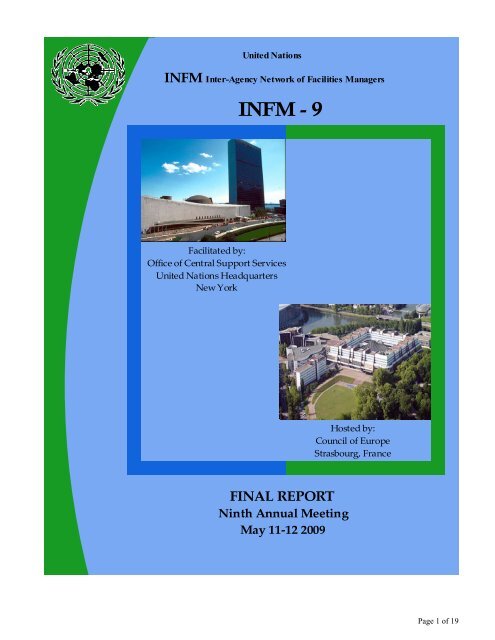
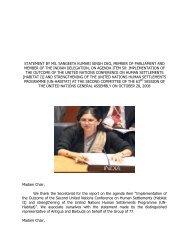
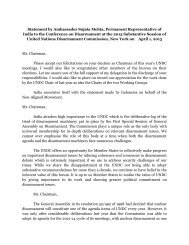
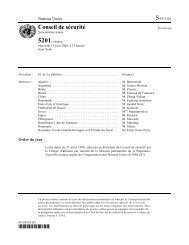
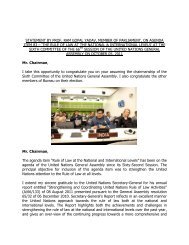
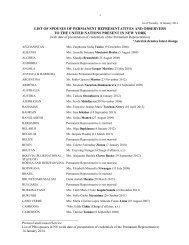
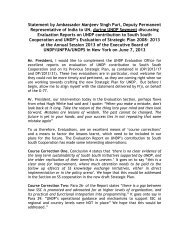
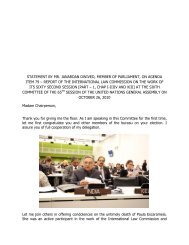
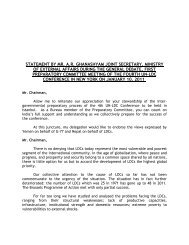
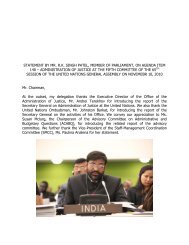
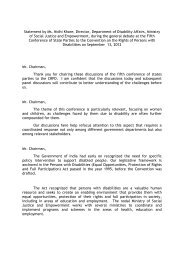
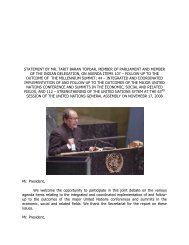
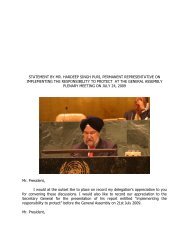
![1 statement by dr.[mrs] kakoli ghosh dastidar - Member States Portal](https://img.yumpu.com/27526598/1/190x245/1-statement-by-drmrs-kakoli-ghosh-dastidar-member-states-portal.jpg?quality=85)
